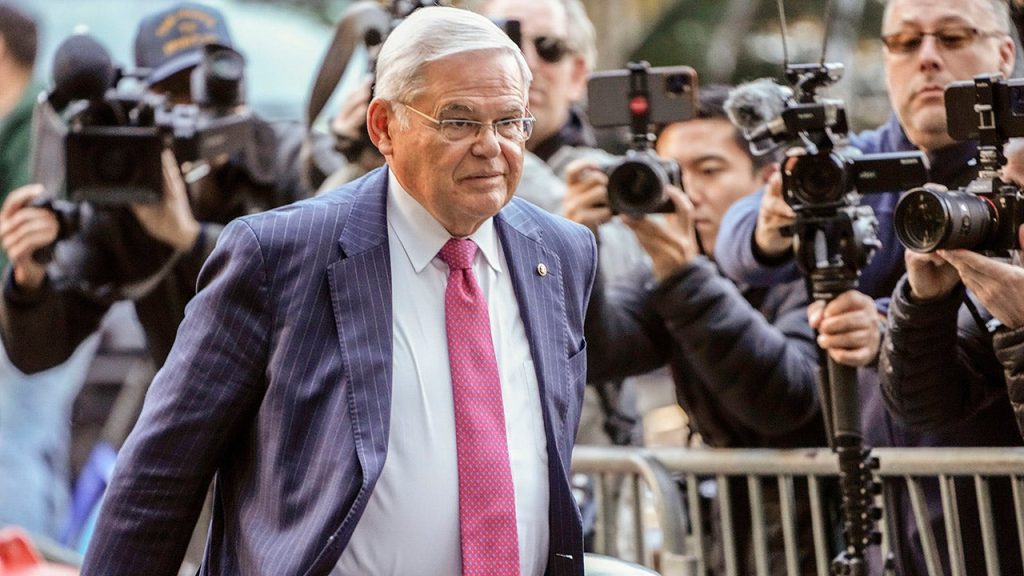The U.S. Department of Justice is seeking a 15-year prison sentence for disgraced former New Jersey Senator Bob Menendez following his conviction in a sprawling bribery and foreign influence scheme. Prosecutors argue that the gravity of Menendez’s crimes, their brazen nature, and their impact on public trust warrant a substantial term of incarceration. The 108-page sentencing memorandum filed by the prosecution paints a picture of a seasoned politician who exploited his position for personal gain, accepting lavish gifts and engaging in illicit backroom dealings with foreign governments. They assert that Menendez’s actions represent a profound abuse of power at the highest levels of government and demand a sentence that reflects the seriousness of his betrayal of the public trust.
The core of the prosecution’s argument rests on the sheer scale and audacity of Menendez’s corruption. The scheme, which spanned several years, allegedly involved accepting over $100,000 in gold bars, cash, and other luxury items from foreign governments, including Egypt and Qatar. In return, Menendez is accused of leveraging his senatorial influence to advance the interests of these nations, effectively putting his office up for sale. The prosecution highlights the “stunning brazenness, breadth, and duration” of the scheme, emphasizing that Menendez’s actions were not isolated incidents but part of a sustained pattern of corrupt behavior. This, they argue, underscores the depth of his culpability and the need for a significant penalty to deter similar conduct in the future.
Prosecutors also underscored the historical significance of Menendez’s conviction, noting that he is the first U.S. Senator to be convicted of acting as a foreign agent. This landmark case, they argue, underscores the vulnerability of democratic institutions to corruption and the importance of holding elected officials accountable for their actions. The Justice Department contends that a substantial prison sentence is necessary not only to punish Menendez but also to send a clear message that such abuses of power will not be tolerated. The 15-year sentence, they argue, would serve as a powerful deterrent, reminding public servants of their ethical obligations and the severe consequences of betraying the public trust.
The prosecution’s case against Menendez also implicates his wife, Nadine Menendez, who is scheduled to stand trial in January 2025. She is accused of receiving paychecks for a non-existent job, further highlighting the alleged pervasiveness of the couple’s corrupt activities. While Nadine Menendez’s case will be handled separately, her alleged involvement reinforces the prosecution’s portrayal of Bob Menendez as the mastermind of a complex and deeply entrenched bribery scheme. This intricate web of corruption, they argue, demands a decisive response from the judicial system to restore public faith in government and ensure the integrity of the democratic process.
The sentencing memorandum meticulously details the various instances of bribery and influence peddling allegedly committed by Menendez. It describes how he used his official position to intervene in government matters on behalf of his benefactors, including influencing visa applications, intervening in contractual disputes, and advocating for specific foreign policy positions. These actions, the prosecution contends, demonstrate a blatant disregard for the rule of law and a willingness to prioritize personal gain over the interests of his constituents and the nation as a whole. They emphasize the “naked greed” and “sense of entitlement” that motivated Menendez’s actions, arguing that such motivations warrant a severe penalty to reflect the egregious nature of his offenses.
The upcoming sentencing hearing in January 2025 will be a pivotal moment in this high-profile corruption case. The judge will consider the arguments presented by both the prosecution and the defense, weighing the seriousness of the crimes against any mitigating factors that may be presented. While the prosecution is pushing for a 15-year sentence, the final decision rests with the judge, who will ultimately determine the appropriate punishment for Menendez’s actions. The outcome of this case will undoubtedly have significant implications for the future of political accountability and the ongoing fight against corruption in government.

